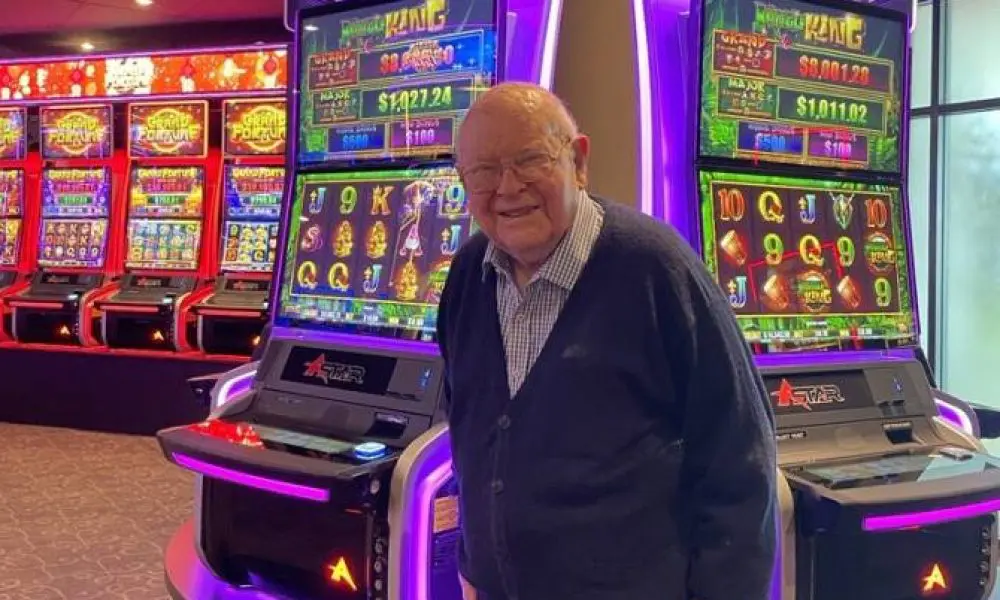Len Ainsworth founded the Australian slot machine company Aristocrat. After he left Aristocrat in the hands of his wives and children, he established Ainsworth Gaming Technology. He sold the majority of his Ainsworth shares to Novomatic in 2017. Len turned 100 years old on July 11.
Ainsworth started making and selling slot machines at the same time New South Wales legalized slots for pubs and social/athletic clubs. NSW proved to be a good market; today, there are approximately 85,000 gaming machines in the state. In time, the other Australian states also legalized slots. Nationwide, out of approximately 190,000 games, the majority are either from Aristocrat or Ainsworth.
Australia turned into a perfect laboratory for slot-machine development. Each new generation was better than the last, as it had to be, to keep the players’ interest. The players were local, they played often, and like the games they played, they became more sophisticated with each new generation.
Ainsworth made several attempts to enter the American market, but was frustrated at every turn by regulatory hurdles. However, in the late 1990s, Aristocrat started to make inroads, at first in Indian country and later into commercial casino jurisdictions. By that time, Aristocrat, then Ainsworth Gaming, were bringing their A-games — multi-line, multi-coin games that were enormously popular wherever they were put. Those games changed the slot industry. IGT and the other American manufacturers are still struggling to catch up.
It is difficult to say what Len Ainsworth’s role was in game development. He certainly was not one of the game designers; he probably did not even hire them. Len’s genius is in management and corporate structure. Twice, he built companies that continually developed new and better games, “better mouse traps,” as he called them. The success of his companies was a matter of pride in Australia and Ainsworth and his family were very generous, supporting hospitals, universities, medical research, and other charities.
Ainsworth’s acceptance has undergone some changes lately. The success of pokies – the slot machines – has attracted the attention of the media, anti-gambling forces, and lawmakers. A serious movement is afoot to impose strict limitations on pokies and pokie players. There are even calls for the hospitals and universities to denounce slot machines and Ainsworth, even to the extent of take his name off their buildings.
The gambling industry in Australia is under heavy siege. The next few years will probably see limitations put on all forms of gaming Down Under and strict limits on gambling advertisements. The battle is ongoing. The clubs and pubs will fight back and they do have some political muscle. But not just the slot machines are under fire. The casinos themselves are also in the crosshairs.
The three major casino companies, Crown, Star, and SkyCity, have all been investigated. Star and Crown have been forced into restructuring and put under monitoring systems. Crown was recently fined $293 million for failing to follow regulatory procedures in money handling. It was a negotiated settlement, though the frustrated judge who approved the settlement said that Europe had negotiated the surrender of Napoleon in less time. Online gambling, sports betting, slot machines, and casinos are all facing an uncertain future in today’s political environment.
One advocate for reform, Tim Costello, is eager to have a national self-exclusion register, like those in place in France, Italy, and Germany. As part of the reforms, NSW will have cashless gaming, with a card that limits what a player can spend and tracks and records all play. No one will be able to play without the card. The intent by reformers is to slowly crank back the size of wagers and the time of play and crank up the loss limits.
Costello asks a valid question. “Why do we have the greatest gambling losses in the world, 40 per cent higher than the nation that comes second? Why, when it comes to sports spending, are our losses on a per capita basis 20 percent higher?” That is not an easy question to answer.
Oddly, one category of gambling, horse racing, is not threatened. The Australians are just as over-the-top enthusiastic about horse races as they are any sport. The fact that horse racing is going unnoticed shows just how conflicted Australia is about gambling.
Seventy years ago, the pubs, clubs, and Len Ainsworth started on a journey. The journey led to two of the biggest and most successful slot machine companies in the world. It also led to the largest per-capita gaming losses in the world. Len had a role; he developed the most popular games. But the Australian propensity to make a wager on anything at any time and for as much as they could also played a part.
At 100 years old, Len Ainsworth deserves to be honored for his work and his generosity and not demonized. Ainsworth did what any good businessperson does: he produced the best product he could for his market. At that there were none better, not just in Australia, but in the world.



